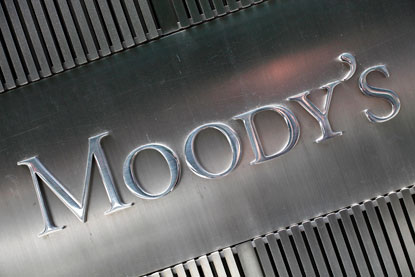By Richard Johnstone | 25 February 2013
The government has been warned that further downgrades of the UK’s credit rating are likely following the decision by Moody’s to strip the country of its triple-A rating.

Analysts said today that other credit agencies would follow the move by Moody’s, which it said was taken due to ‘continuing weakness’ in the projections for economic growth.
The downgrade, revealed on Friday evening, is a blow to Chancellor George Osborne, who said maintaining the top rating would be the ‘first benchmark’ of the government’s deficit reduction plan.
Announcing the decision to reduce the rating by one notch to Aa1, Moody’s said ‘sluggish growth’ in the UK was now expected to extend into the second half of the decade.
As a result, the government’s fiscal consolidation plan would extend well into the next Parliament, the agency’s Global Credit Research report stated. This means public sector debt was likely to continue increasing until 2016.
Earlier this month, independent analysts at the Institute for Fiscal Studies forecast that the government was likely to borrow £64bn more in 2014/15 than originally expected.
Moody’s said uncertainty about the pace of fiscal consolidation would increase public sector debt to more than 96% of gross domestic product in 2016. This higher-than-expected debt burden meant the Treasury’s balance sheet might not be able to absorb additional shocks to the economy, it added.
Azad Zangana, European economist at Schroders, said the downgrade came as ‘no surprise’, with the economy on the verge of a triple-dip recession.
He added: ‘Overall, this downgrade had been on the cards for some time, and the market reaction this morning suggests there are bigger concerns out there for investors, such as the elections in Italy for example. Both Standard and Poor’s and Fitch also have the UK’s outlook on negative watch, and so we expect the others to follow suit. This could push some investors that are forced to hold triple-A rated assets to sell out of gilts. However, in a world where the pool of triple-A rated assets is shrinking, we do not expect to see much of an impact.’
Responding to the news, Osborne, who will deliver his Budget on March 20, said the downgrade was ‘a stark reminder of the debt problems facing our country’.
He added: ‘Far from weakening our resolve to deliver our economic recovery plan, this decision redoubles it. We will go on delivering the plan that has cut the deficit by a quarter, and given us record low interest rates and record numbers of jobs.
‘As the rating agency says, Britain faces huge challenges at home from the debts built up over many, many years, and it is made no easier by the very weak economic situation in Europe. Crucially for families and businesses, they say that “the UK's creditworthiness remains extremely high” thanks in part to a “strong track record of fiscal consolidation” and our “political will”. They also make it absolutely clear that they could downgrade the UK’s credit rating further in the event of “reduced political commitment to fiscal consolidation”.’
Shadow chancellor Ed Balls said the downgrade was a ‘humiliating blow to a prime minister and chancellor who said keeping our AAA rating was the test of their economic and political credibility’.
He added: ‘It would be a big mistake to get carried away with what Moody's or any other credit rating agency says. Tonight's verdict does not change the fact that the credit rating agencies have made major misjudgements over recent years, not least in giving top ratings to US sub-prime mortgages before the global financial crash.
‘But what matters is the economic reality that the credit rating agencies are responding to. Moody's themselves say the main driver of their decision is the weak growth in Britain's economy. Their judgement is in response to nearly three years of stagnation, a double-dip recession, billions more borrowing as confirmed this week and broken fiscal rules. This is why the chancellor is fast running out of credibility.’




















